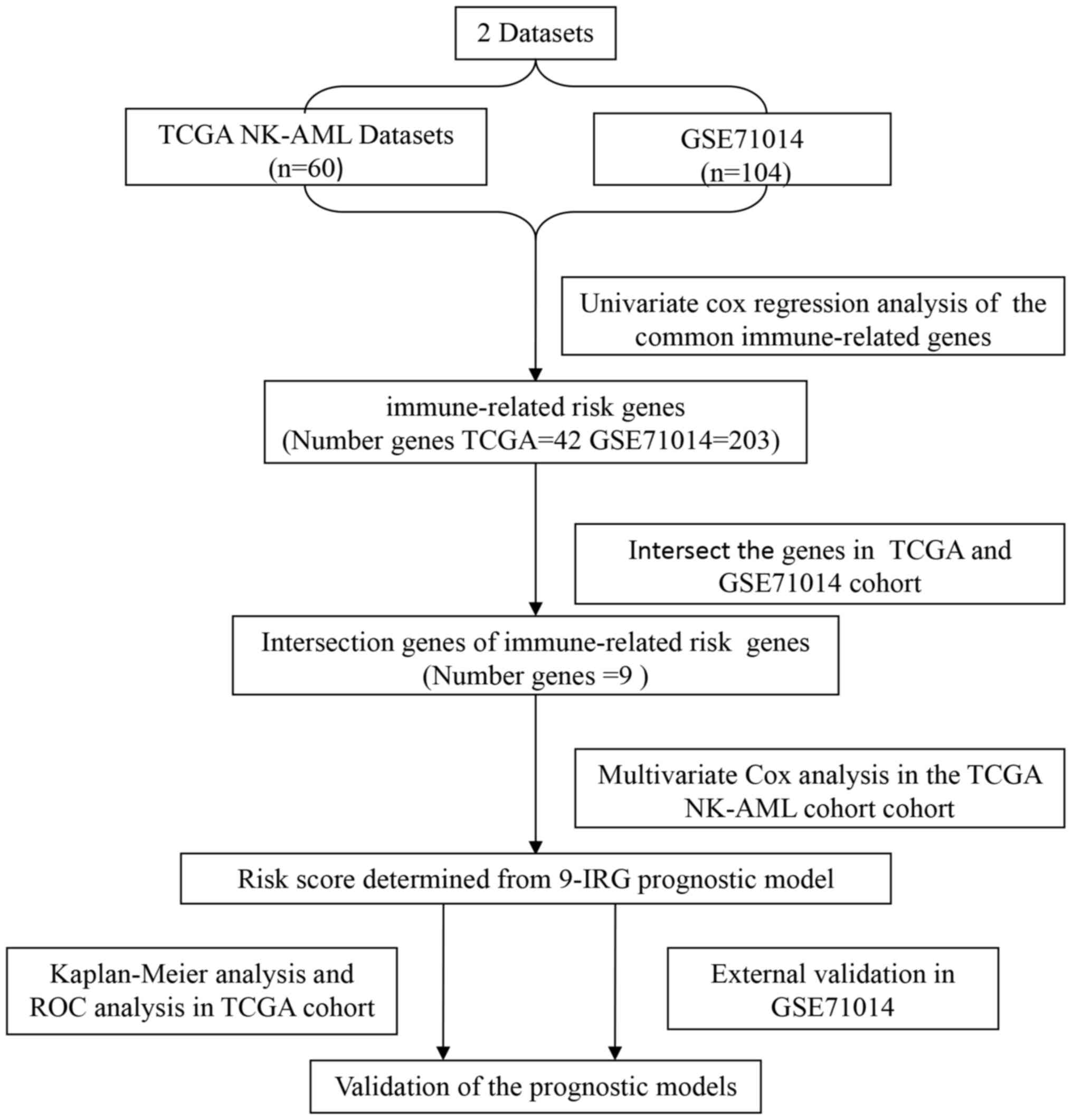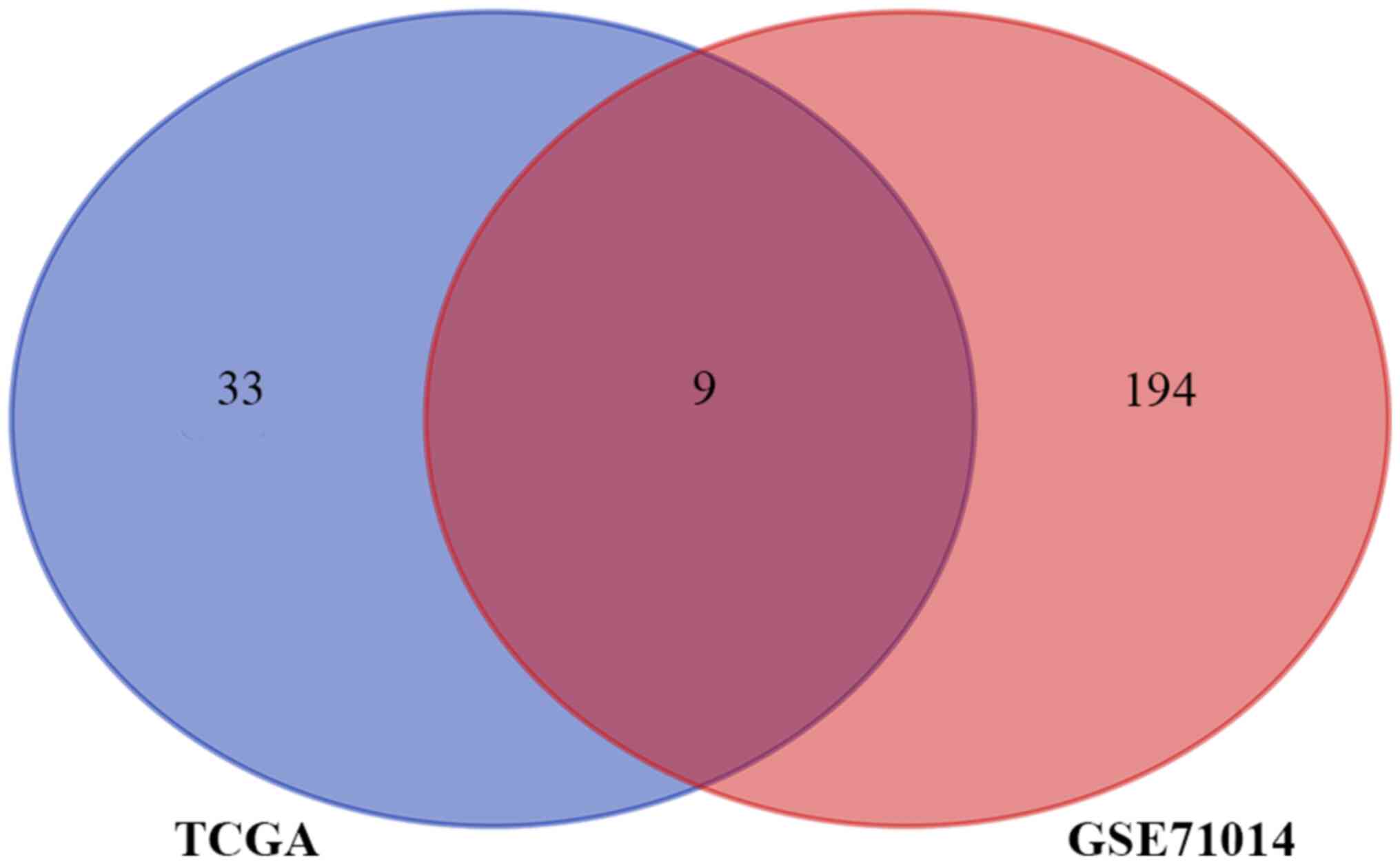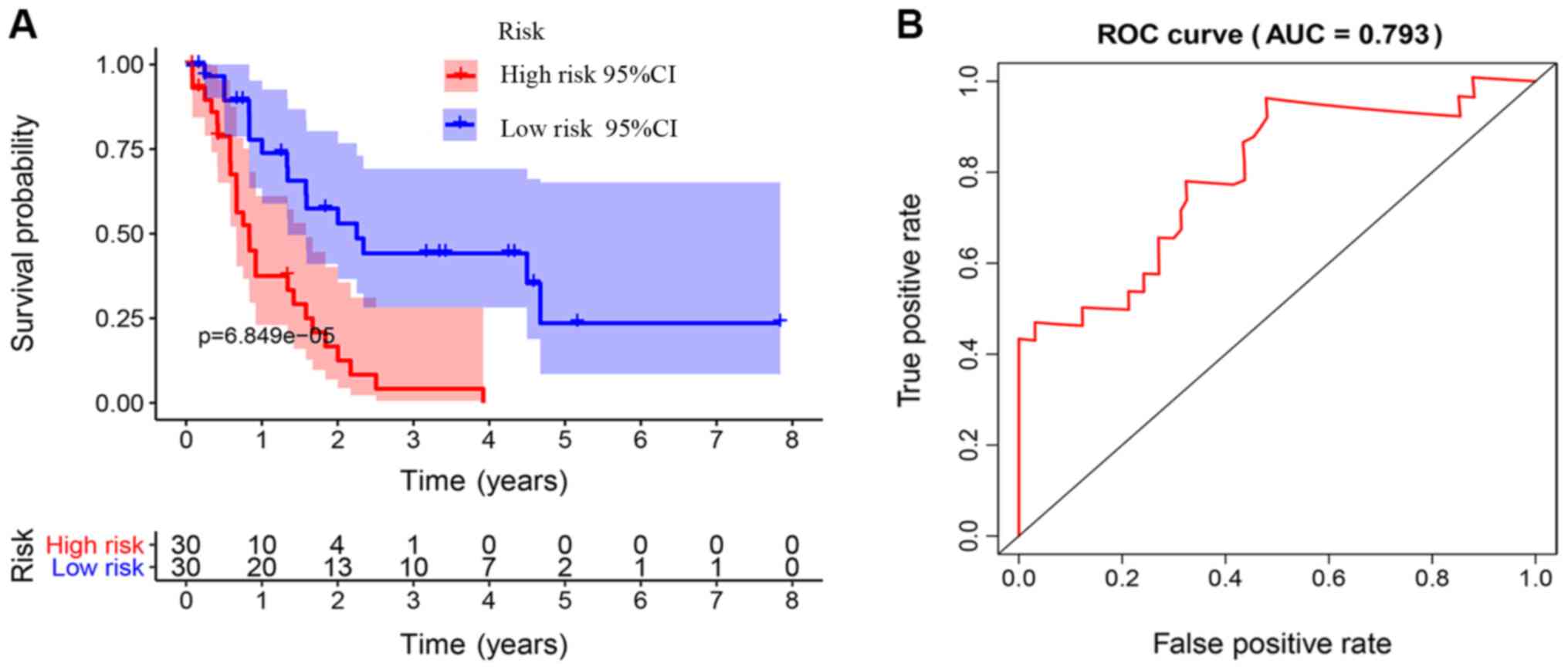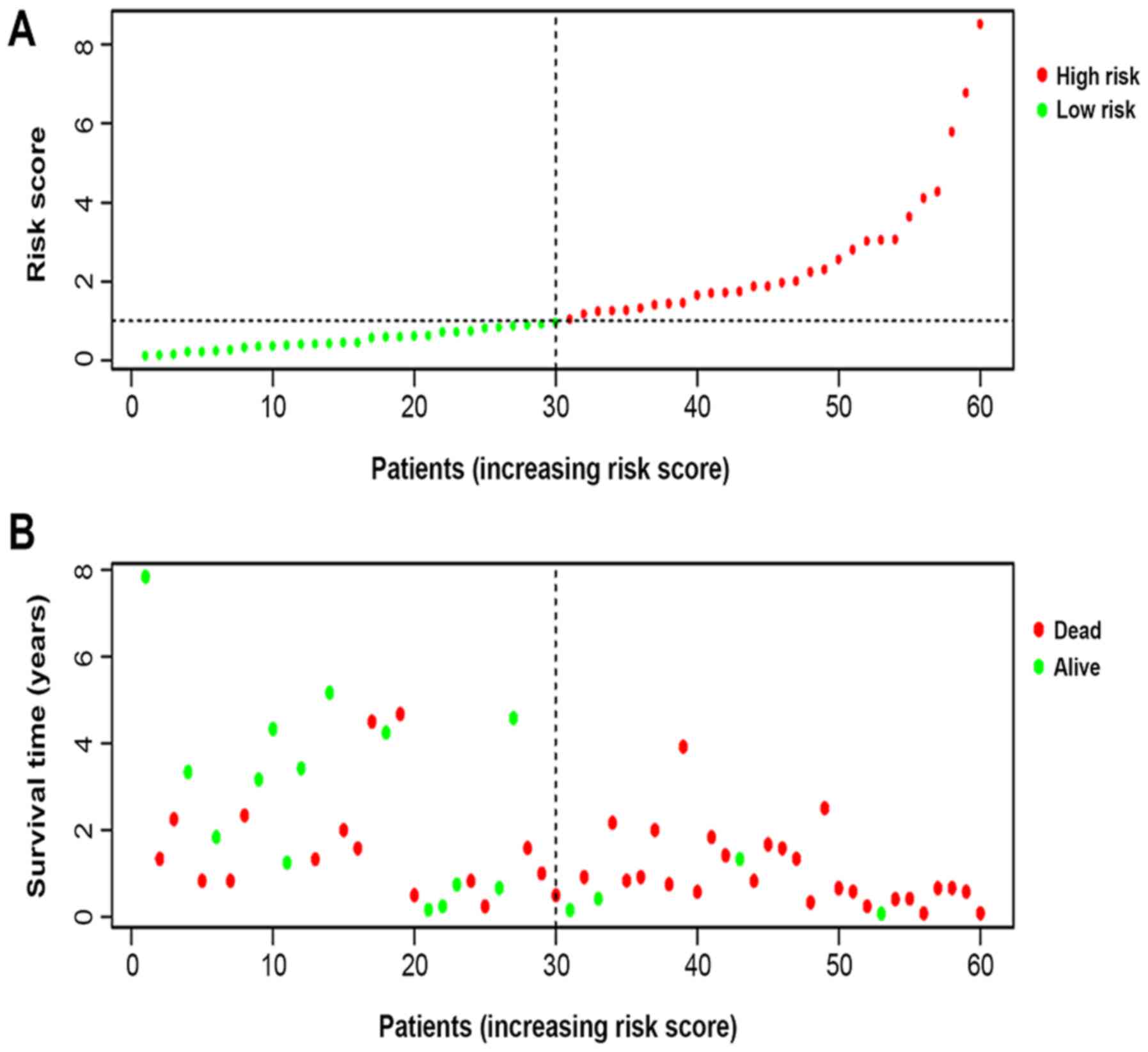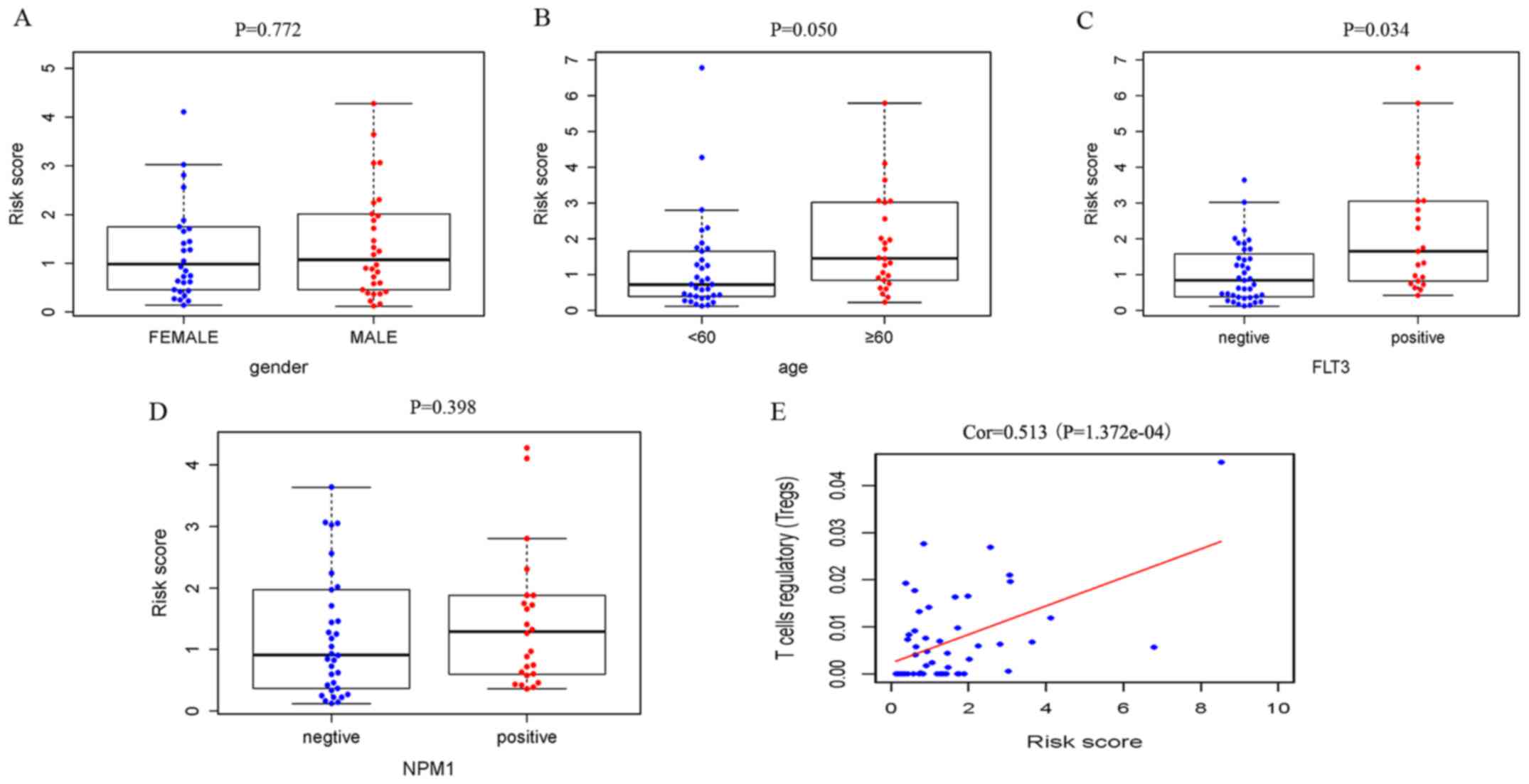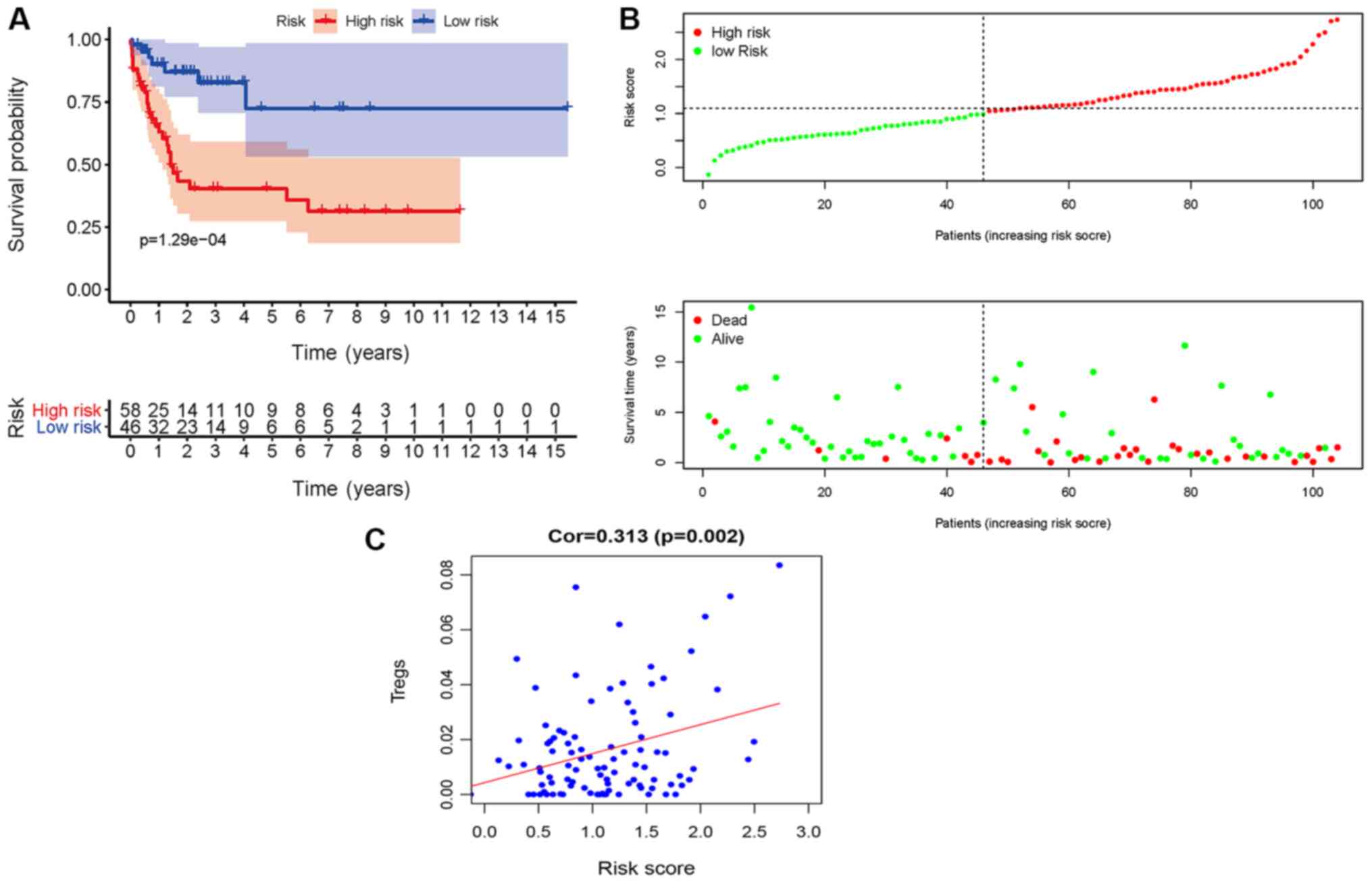|
1
|
Grimwade D, Walker H, Oliver F, Wheatley
K, Harrison C, Harrison G, Rees J, Hann I, Stevens R, Burnett A and
Goldstone A: The importance of diagnostic cytogenetics on outcome
in AML: Analysis of 1,612 patients entered into the MRC AML 10
trial. The medical research council adult and children's leukaemia
working parties. Blood. 92:2322–2333. 1998. View Article : Google Scholar : PubMed/NCBI
|
|
2
|
Kihara R, Nagata Y, Kiyoi H, Kato T,
Yamamoto E, Suzuki K, Chen F, Asou N, Ohtake S, Miyawaki S, et al:
Comprehensive analysis of genetic alterations and their prognostic
impacts in adult acute myeloid leukemia patients. Leukemia.
28:1586–1595. 2014. View Article : Google Scholar : PubMed/NCBI
|
|
3
|
Song Y, Zhang W, He X, Liu X, Yang P, Wang
J, Hu K, Liu W, Zhang X, Jing H and Yuan X: High NCALD expression
predicts poor prognosis of cytogenetic normal acute myeloid
leukemia. J Transl Med. 17:1662019. View Article : Google Scholar : PubMed/NCBI
|
|
4
|
Fu L, Shi J, Hu K, Wang J, Wang W and Ke
X: Mitogen-activated protein kinase binding protein 1 (MAPKBP1) is
an unfavorable prognostic biomarker in cytogenetically normal acute
myeloid leukemia. Oncotarget. 6:8144–8154. 2015. View Article : Google Scholar : PubMed/NCBI
|
|
5
|
Fu L, Fu H, Qiao J, Pang Y, Xu K, Zhou L,
Wu Q, Li Z, Ke X, Xu K and Shi J: High expression of CPNE3 predicts
adverse prognosis in acute myeloid leukemia. Cancer Sci.
108:1850–1857. 2017. View Article : Google Scholar : PubMed/NCBI
|
|
6
|
Fu L, Fu H, Tian L, Xu K, Hu K, Wang J,
Wang J, Jing H, Shi J and Ke X: High expression of RUNX1 is
associated with poorer outcomes in cytogenetically normal acute
myeloid leukemia. Oncotarget. 7:15828–15839. 2016. View Article : Google Scholar : PubMed/NCBI
|
|
7
|
Ahn JS, Kim HJ, Kim YK, Lee SS, Ahn SY,
Jung SH, Yang DH, Lee JJ, Park HJ, Lee JY, et al: Assessment of a
new genomic classification system in acute myeloid leukemia with a
normal karyotype. Oncotarget. 9:4961–4968. 2017. View Article : Google Scholar : PubMed/NCBI
|
|
8
|
Slovak ML, Kopecky KJ, Cassileth PA,
Harrington DH, Theil KS, Mohamed A, Paietta E, Willman CL, Head DR,
Rowe JM, et al: Karyotypic analysis predicts outcome of
preremission and postremission therapy in adult acute myeloid
leukemia: A Southwest Oncology Group/Eastern Cooperative Oncology
Group study. Blood. 96:4075–4083. 2000. View Article : Google Scholar : PubMed/NCBI
|
|
9
|
Bullinger L, Döhner K, Bair E, Fröhling S,
Schlenk RF, Tibshirani R, Döhner H and Pollack JR: Use of
gene-expression profiling to identify prognostic subclasses in
adult acute myeloid leukemia. N Engl J Med. 350:1605–1616. 2004.
View Article : Google Scholar : PubMed/NCBI
|
|
10
|
Teague RM and Kline J: Immune evasion in
acute myeloid leukemia: Current concepts and future directions. J
Immunother Cancer. 1:12013. View Article : Google Scholar : PubMed/NCBI
|
|
11
|
Austin R, Smyth MJ and Lane SW: Harnessing
the immune system in acute myeloid leukaemia. Crit Rev Oncol
Hematol. 103:62–77. 2016. View Article : Google Scholar : PubMed/NCBI
|
|
12
|
Nishioka C, Ikezoe T, Pan B, Xu K and
Yokoyama A: MicroRNA-9 plays a role in interleukin-10-mediated
expression of E-cadherin in acute myelogenous leukemia cells.
Cancer Sci. 108:685–695. 2017. View Article : Google Scholar : PubMed/NCBI
|
|
13
|
Sanchez-Correa B, Bergua JM, Pera A,
Campos C, Arcos MJ, Bañas H, Duran E, Solana R and Tarazona R:
In vitro culture with interleukin-15 leads to expression of
activating receptors and recovery of natural killer cell function
in acute myeloid leukemia patients. Front Immunol. 8:9312017.
View Article : Google Scholar : PubMed/NCBI
|
|
14
|
van Galen P, Hovestadt V, Wadsworth Ii MH,
Hughes TK, Griffin GK, Battaglia S, Verga JA, Stephansky J, Pastika
TJ, Story JL, et al: Single-cell RNA-Seq reveals AML hierarchies
relevant to disease progression and immunity. Cell. 176:1265–1281.
2019. View Article : Google Scholar : PubMed/NCBI
|
|
15
|
Nakase K, Kita K, Kyo T, Tsuji K and
Katayama N: High serum levels of soluble interleukin-2 receptor in
acute myeloid leukemia: Correlation with poor prognosis and CD4
expression on blasT cells. Cancer Epidemiol. 36:e306–e309. 2012.
View Article : Google Scholar : PubMed/NCBI
|
|
16
|
Zhou Q, Munger ME, Highfill SL, Tolar J,
Weigel BJ, Riddle M, Sharpe AH, Vallera DA, Azuma M, Levine BL, et
al: Program death-1 signaling and regulatory T cells collaborate to
resist the function of adoptively transferred cytotoxic T
lymphocytes in advanced acute myeloid leukemia. Blood.
116:2484–2493. 2010. View Article : Google Scholar : PubMed/NCBI
|
|
17
|
Bachli EB, Schaer DJ, Walter RB, Fehr J
and Schoedon G: Functional expression of the CD163 scavenger
receptor on acute myeloid leukemia cells of monocytic lineage. J
Leukoc Biol. 79:312–318. 2006. View Article : Google Scholar : PubMed/NCBI
|
|
18
|
Cancer Genome Atlas Research Network, ;
Ley TJ, Miller C, Ding L, Raphael BJ, Mungall AJ, Robertson A,
Hoadley K, Triche TJ Jr, Laird PW, et al: Genomic and epigenomic
landscapes of adult de novo acute myeloid leukemia. N Engl J Med.
368:2059–2074. 2013. View Article : Google Scholar : PubMed/NCBI
|
|
19
|
Chuang MK, Chiu YC, Chou WC, Hou HA, Tseng
MH, Kuo YY, Chen Y, Chuang EY and Tien HF: An mRNA expression
signature for prognostication in de novo acute myeloid leukemia
patients with normal karyotype. Oncotarget. 6:39098–39110. 2015.
View Article : Google Scholar : PubMed/NCBI
|
|
20
|
Bhattacharya S, Andorf S, Gomes L, Dunn P,
Schaefer H, Pontius J, Berger P, Desborough V, Smith T, Campbell J,
et al: ImmPort: Disseminating data to the public for the future of
immunology. Immunol Res. 58:234–239. 2014. View Article : Google Scholar : PubMed/NCBI
|
|
21
|
Newman AM, Liu CL, Green MR, Gentles AJ,
Feng W, Xu Y, Hoang CD, Diehn M and Alizadeh AA: Robust enumeration
of cell subsets from tissue expression profiles. Nat Methods.
12:453–457. 2015. View Article : Google Scholar : PubMed/NCBI
|
|
22
|
Ramzi M, Khalafi-Nezhad A, IravaniSaadi M
and Jowkar Z: Association between TLR2 and TLR4 expression and
response to induction therapy in acute myeloid leukemia patients.
Int J Hematol Oncol Stem Cell Res. 12:303–312. 2018.PubMed/NCBI
|
|
23
|
Yan H, Qu J, Cao W, Liu Y, Zheng G, Zhang
E and Cai Z: Identification of prognostic genes in the acute
myeloid leukemia immune microenvironment based on TCGA data
analysis. Cancer Immunol Immunother. 68:1971–1978. 2019. View Article : Google Scholar : PubMed/NCBI
|
|
24
|
Gao G, Guo X and Goff SP: Inhibition of
retroviral RNA production by ZAP, a CCCH-type zinc finger protein.
Science. 297:1703–1706. 2002. View Article : Google Scholar : PubMed/NCBI
|
|
25
|
Wu B, Shi N, Sun L and Liu L: Clinical
value of high expression level of CD71 in acute myeloid leukemia.
Neoplasma. 63:809–815. 2016. View Article : Google Scholar : PubMed/NCBI
|
|
26
|
Kollia P, Samara M, Stamatopoulos K,
Belessi C, Stavroyianni N, Tsompanakou A, Athanasiadou A,
Vamvakopoulos N, Laoutaris N, Anagnostopoulos A and Fassas A:
Molecular evidence for transferrin receptor 2 expression in all FAB
subtypes of acute myeloid leukemia. Leuk Res. 27:1101–1103. 2003.
View Article : Google Scholar : PubMed/NCBI
|
|
27
|
Kollia P, Stavroyianni N, Stamatopoulos K,
Zoi K, Viniou N, Mantzourani M, Noguchi CT, Paterakis G, Abazis D,
Pangalos C, et al: Molecular analysis of transferrin receptor mRNA
expression in acute myeloid leukaemia. Br J Haematol. 115:19–24.
2001. View Article : Google Scholar : PubMed/NCBI
|
|
28
|
Hou HA, Lu JW, Lin TY, Tsai CH, Chou WC,
Lin CC, Kuo YY, Liu CY, Tseng MH, Chiang YC, et al:
Clinico-biological significance of suppressor of cytokine signaling
1 expression in acute myeloid leukemia. Blood Cancer J. 7:e5882017.
View Article : Google Scholar : PubMed/NCBI
|
|
29
|
Annabi B, Currie JC, Moghrabi A and
Béliveau R: Inhibition of HuR and MMP-9 expression in
macrophage-differentiated HL-60 myeloid leukemia cells by green tea
polyphenol EGCg. Leuk Res. 31:1277–1284. 2007. View Article : Google Scholar : PubMed/NCBI
|
|
30
|
Han S, Cao C, Tang T, Lu C, Xu J, Wang S,
Xue L, Zhang X and Li M: ROBO3 promotes growth and metastasis of
pancreatic carcinoma. Cancer Lett. 366:61–70. 2015. View Article : Google Scholar : PubMed/NCBI
|
|
31
|
Narayan G, Goparaju C, Arias-Pulido H,
Kaufmann AM, Schneider A, Dürst M, Mansukhani M, Pothuri B and
Murty VV: Promoter hypermethylation-mediated inactivation of
multiple Slit-Robo pathway genes in cervical cancer progression.
Mol Cancer. 5:162006. View Article : Google Scholar : PubMed/NCBI
|
|
32
|
Koehn J, Huesken D, Jaritz M, Rot A,
Zurini M, Dwertmann A, Beutler B and Korthäuer U: Assessing the
function of human UNC-93B in toll-like receptor signaling and major
histocompatibility complex II response. Hum Immunol. 68:871–878.
2007. View Article : Google Scholar : PubMed/NCBI
|
|
33
|
Goto Y, Arigami T, Kitago M, Nguyen SL,
Narita N, Ferrone S, Morton DL, Irie RF and Hoon DS: Activation of
toll-like receptors 2, 3, and 4 on human melanoma cells induces
inflammatory factors. Mol Cancer Ther. 7:3642–3653. 2008.
View Article : Google Scholar : PubMed/NCBI
|
|
34
|
Beghini A, Ripamonti CB, Peterlongo P,
Roversi G, Cairoli R, Morra E and Larizza L: RNA hyperediting and
alternative splicing of hematopoietic cell phosphatase (PTPN6) gene
in acute myeloid leukemia. Hum Mol Genet. 9:2297–2304. 2000.
View Article : Google Scholar : PubMed/NCBI
|
|
35
|
Terwijn M, Feller N, van Rhenen A, Kelder
A, Westra G, Zweegman S, Ossenkoppele G and Schuurhuis GJ:
Interleukin-2 receptor alpha-chain (CD25) expression on leukaemic
blasts is predictive for outcome and level of residual disease in
AML. Eur J Cancer. 45:1692–1699. 2009. View Article : Google Scholar : PubMed/NCBI
|
|
36
|
Fujiwara SI, Muroi K, Yamamoto C, Hatano
K, Okazuka K, Sato K, Oh I, Ohmine K, Suzuki T and Ozawa K: CD25 as
an adverse prognostic factor in elderly patients with acute myeloid
leukemia. Hematology. 22:347–353. 2017. View Article : Google Scholar : PubMed/NCBI
|
|
37
|
Testa U, Riccioni R, Diverio D, Rossini A,
Coco FL and Peschle C: Interleukin-3 receptor in acute leukemia.
Leukemia. 18:219–226. 2004. View Article : Google Scholar : PubMed/NCBI
|
|
38
|
Fey MF and Buske C; ESMO Guidelines
Working Group, : Acute myeloblastic leukaemias in adult patients:
ESMO clinical practice guidelines for diagnosis, treatment and
follow-up. Ann Oncol. 24 (Suppl 6):vi138–vi143. 2013. View Article : Google Scholar : PubMed/NCBI
|
|
39
|
Szczepanski MJ, Szajnik M, Czystowska M,
Mandapathil M, Strauss L, Welsh A, Foon KA, Whiteside TL and
Boyiadzis M: Increased frequency and suppression by regulatory T
cells in patients with acute myelogenous leukemia. Clin Cancer Res.
15:3325–3332. 2009. View Article : Google Scholar : PubMed/NCBI
|
|
40
|
Williams P, Basu S, Garcia-Manero G,
Hourigan CS, Oetjen KA, Cortes JE, Ravandi F, Jabbour EJ, Al-Hamal
Z, Konopleva M, et al: The distribution of T-cell subsets and the
expression of immune checkpoint receptors and ligands in patients
with newly diagnosed and relapsed acute myeloid leukemia. Cancer.
125:1470–1481. 2019. View Article : Google Scholar : PubMed/NCBI
|
|
41
|
Radpour R, Riether C, Simillion C, Höpner
S, Bruggmann R and Ochsenbein AF: CD8+ T cells expand
stem and progenitor cells in favorable but not adverse risk acute
myeloid leukemia. Leukemia. 33:2379–2392. 2019. View Article : Google Scholar : PubMed/NCBI
|















